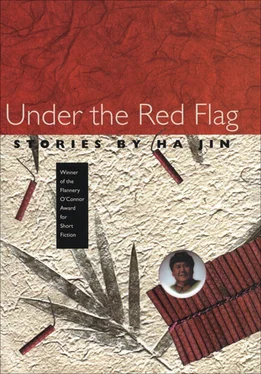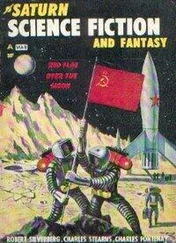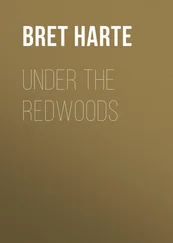Ha Jin
Under the Red Flag
“In Broad Daylight” first appeared in the Kenyon Review and was winner of the Kenyon Review Prize for Fiction (1993) as well as the Pushcart Prize (1995). It was reprinted in Norton Introduction to Fiction, Norton Introduction to Literature , and Into the Widening World: International Coming-of-Age Stories , ed. John Loughery (Persea Books). “Emperor” was also first published in the Kenyon Review. “Man to Be” originally appeared in TriQuarterly under a slightly different title and was winner of the Pushcart Prize (1997). “Winds and Clouds over a Funeral” was first published in the Indiana Review, “The Richest Man” in the North American Review, “New Arrival” in the Chicago Review, “Fortune” in the International Quarterly , ”Resurrection” in the Atlantic Monthly , and “A Decade” in Cicada .
While I was eating corn cake and jellyfish at lunch, our gate was thrown open and Bare Hips hopped in. His large wooden pistol was stuck partly inside the waist of his blue shorts. “White Cat,” he called me by my nickname, “hurry, let’s go. They caught Old Whore at her home. They’re going to take her through the streets this afternoon.”
“Really?” I put down my bowl, which was almost empty, and rushed to the inner room for my undershirt and sandals. “I’ll be back in a second.”
“Bare Hips, did you say they’ll parade Mu Ying today?” I heard Grandma ask in her husky voice.
“Yes, all the kids on our street have left for her house. I came to tell White Cat.” He paused. “Hey, White Cat, hurry up!”
“Coming,” I cried, still looking for my sandals.
“Good, good!” Grandma said to Bare Hips, while flapping at flies with her large palm-leaf fan. “They should burn the bitch on Heaven Lamp like they did in the old days.”
“Come, let’s go,” Bare Hips said to me the moment I was back. He turned to the door; I picked up my wooden scimitar and followed him.
“Put on your shoes, dear.” Grandma stretched out her fan to stop me.
“No time for that, Grandma. I’ve got to be quick, or I’ll miss something and won’t be able to tell you the whole story when I get back.”
We dashed into the street while Grandma was shouting behind us, “Come back. Take the rubber shoes with you.”
We charged toward Mu Ying’s home on Eternal Way, waving our weapons above our heads. Grandma was crippled and never came out of our small yard. That was why I had to tell her about what was going on outside. But she knew Mu Ying well, just as all the old women in our town knew Mu well and hated her. Whenever they heard she had a man in her home again, these women would say, “This time they ought to burn Old Whore on Heaven Lamp.”
What they referred to was the old way of punishing an adulteress. Though they had lived in the New China for almost two decades, some ancient notions still stuck in their heads. Grandma told me about many of the executions in the old days that she had seen with her own eyes. Officials used to have the criminals of adultery executed in two different ways. They beheaded the man. He was tied to a stake on the platform at the marketplace. At the first blare of horns, a masked headsman ascended the platform holding a broad ax before his chest; at the second blare of horns, the headsman approached the criminal and raised the ax over his head; at the third blare of horns, the head was lopped off and fell to the ground. If the man’s family members were waiting beneath the platform, his head would be picked up to be buried with his body; if no family member was nearby, dogs would carry the head away and chase each other around until they ate up the flesh and returned for the body.
Unlike the man, the woman involved was executed on Heaven Lamp. She was hung naked upside down above a wood fire whose flames could barely touch her scalp, and two men flogged away at her with whips made of bulls’ penises. Meanwhile she screamed for help and the whole town could hear her. Since the fire merely scorched her head, it took at least half a day for her to stop shrieking and a day and a night to die completely. People used to believe that the way of punishment was justified by heaven, so the fire was called Heaven Lamp. But that was an old custom; nobody believed they would burn Mu Ying that way.
Mu’s home, a small granite house with cement tiles built a year before, was next to East Wind Inn on the northern side of Eternal Way. When we entered that street, Bare Hips and I couldn’t help looking around tremulously, because that area was the territory of the children living there. Two of the fiercest boys, who would kill without thinking twice, ruled that part of town. Whenever a boy from another street wandered into Eternal Way, they would capture him and beat him up. Of course we did the same thing; if we caught one of them in our territory, we would at least confiscate whatever he had with him: grasshopper cages, slingshots, bottle caps, marbles, cartridge cases, and so on. We would also make him call every one of us “Father” or “Grandfather.” But today hundreds of children and grown-ups were pouring into Eternal Way; two dozen urchins on that street surely couldn’t hold their ground. Besides, they had already adopted a truce, since they were more eager to see the Red Guards drag Mu Ying out of her den.
When we arrived, Mu was being brought out through a large crowd at the front gate. Inside her yard there were three rows of colorful washing hung on iron wires, and there was also a grape trellis. Seven or eight children were in there, plucking off grapes and eating them. Two Red Guards held Mu Ying by the arms, and the other Red Guards, about twenty of them, followed behind. They were all from Dalian City and wore homemade army uniforms. God knew how they came to know there was a bad woman in our town. Though people hated Mu and called her names, no one would rough her up. These Red Guards were strangers, so they wouldn’t mind doing it.
Surprisingly, Mu looked rather calm; she neither protested nor said a word. The two Red Guards let go of her arms, and she followed them quietly into West Street. We all moved with them. Some children ran several paces ahead to look back at her.
Mu wore a sky-blue dress, which made her different from the other women who were always in jackets and pants suitable for honest work. In fact, even we small boys could tell that she was really handsome, perhaps the best looking woman of her age in town. Though in her fifties, she didn’t have a single gray hair; she was a little plump, but because of her long legs and arms she appeared rather queenly. While most of the women had sallow faces, hers looked white and healthy like fresh milk.
Skipping in front of the crowd, Bare Hips turned around and cried out at her, “Shameless Old Whore!”
She glanced at him, her round eyes flashing; the mole beside her left nostril grew darker. Grandma had assured me that Mu’s mole was not a beauty-mole but a tear-mole. This meant her life would be soaked in tears.
We knew where we were going, to White Mansion, which was our classroom building, the only two-story house in town. As we came to the end of West Street, a short man ran out from a street corner, panting for breath and holding a sickle. He was Meng Su, Mu Ying’s husband, who sold bean jelly in summer and sugarcoated haws in winter at the marketplace. He paused in front of the large crowd, as though having forgotten why he had rushed over. He turned his head around to look back; there was nobody behind him. After a short moment he moved close, rather carefully.
Читать дальше












